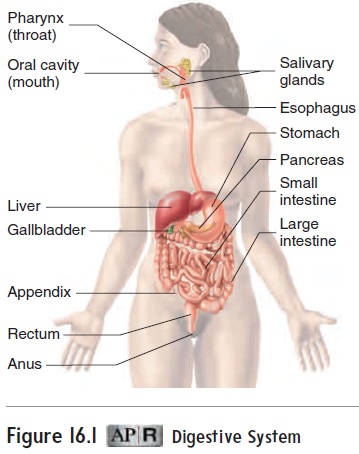Chapter: Essentials of Anatomy and Physiology: Digestive System
Effects of Aging on the Digestive System
EFFECTS OF AGING ON THE DIGESTIVE SYSTEM
As a person ages, the connective tissue layers of the digestive tract—the submucosa and serosa—tend to thin. The blood sup-ply to the digestive tract decreases. There is also a decrease in the number of smooth muscle cells in the muscularis, resulting in decreased motility in the digestive tract. In addition, goblet cells within the mucosa secrete less mucus. Glands along the diges-tive tract, such as the gastric glands, the liver, and the pancreas, also tend to secrete less with age. However, these changes by themselves don’t appreciably decrease the function of the diges-tive system.
Through the years, the digestive tract, like the skin and lungs, is directly exposed to materials from the outside environ-ment. Some of those substances can cause mechanical damage to the digestive tract, and others may be toxic to the tissues. Because the connective tissue of the digestive tract becomes thin with age and because the protective mucous covering is reduced, the digestive tract of elderly people becomes less and less protected from these outside influences. In addition, the mucosa of elderly people tends to heal more slowly following injury. The liver’s ability to detoxify certain chemicals tends todecline; the ability of the hepatic phagocytic cells to remove particulate contaminants decreases; and the liver’s ability to store glycogen decreases.

This overall decline in the defenses of the digestive tract leaves elderly people more susceptible to infections and to the effects of toxic agents. Elderly people are more likely to develop ulcerations and cancers of the digestive tract. Colorectal cancers, for example, are the second leading cause of cancer deaths in the United States, with an estimated 135,000 new cases and 57,000 deaths each year.
Gastroesophageal reflux disorder (GERD) increases with advancing age. It is probably the main reason that elderly people take antacids and inhibitors of hydrochloric acid secretion. Disorders that are not necessarily age-induced, such as hiatal hernia and irregular or inadequate esophageal motility, may be worsened by the effects of aging, because of general decreased motility in the digestive tract.
The enamel on the surface of elderly people’s teeth becomes thinner with age and may expose the underlying dentin. In addition, the gingiva covering the tooth root recedes, exposing additional dentin. Exposed dentin may become painful and change the person’s eating habits. Many elderly people also lose teeth, which can have a marked effect on eating habits unless artificial teeth are provided. The muscles of mastication tend to become weaker; as a result, older people tend to chew their food less before swallowing.
Related Topics